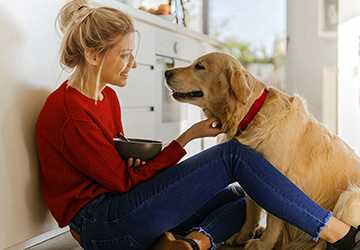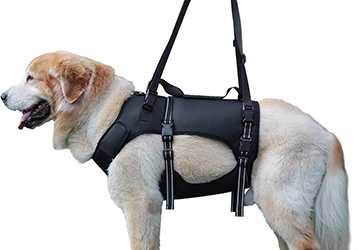How to Help Your Aging Pet Stay Comfortable
Our dearest pets may need additional care and attention to ensure their cosiness and wellness with age. Just like older adults, ageing dogs also develop different health issues. To help your ageing pet stay comfortable and happy, here are five simple yet effective tips: To help your ageing pet stay comfortable and happy, here are five simple yet effective tips:
Give Them a Place to Sleep
You need a comfortable, supportive bed for your old pet, especially if they lounge or nap long. The bed should offer enough assistance for their joints and muscles, such as orthopaedic beds for ageing pets. Choose a bed with soft, well-cushioned padding that provides a restful surface where pressure points are removed.

The bed should be located in a spot free of drafts and noise. A warm blanket or heated mattress pad can generate heat to create a soothing sleeping environment for your pet.
Keep Proper Dietary Habits
A balanced diet is essential for the dogs to ensure their proper well-being and health. Make sure to get opinions from a vet about the appropriate diet for your older dogs according to their health conditions and breed.
Senior pets can be fed diets specifically designed for them, with speciality ingredients addressing joint health, digestion, and weight management.
Regular Routine of Exercise
Older pets lose the energy they used to have when they were younger, but their physical and mental health needs still require exercise and mental stimulation. Consider your pet for light activities like short walks, playful sessions with toys, and other things that engage the body and the mind. Consider puzzle or treat-dispensing toys that challenge your pet's mental abilities and keep the brain active.
Provide Joint Support
Many senior pets show signs of stiffening joints, arthritis, or other problems with their mobility as they grow old. Cooperate with the vet by giving supplements they recommend, like glucosamine and chondroitin, in your pet's diet. These supplements help in joint care, reduce inflammation, and improve mobility at the same time. Instead of cables and stairs, try ramps or stairs to let your pet access raised areas like beds to prevent joint strain. Offering your pet with non-slip, soft surfaces will avoid slipping and falling.
Regular Veterinary Checkups
A routine medical examination of your ageing pet is necessary for monitoring health and taking action early on problems if the diagnosis is made. During regular wellness exams with your veterinarian, you can get your pet's general health checked, age-related diseases diagnosed, and preventative care measures can be discussed. Have a vaccination, dental cleaning, or screenings for common health concerns in senior pets, such as arthritis, dental disease, and vision or hearing problems. Tackling the health problems of our animal friends as early as possible can help our pets cope better and live longer.
Create a Senior-Friendly Environment
Carefully modify the general circumstances of your home to adapt to the transition of your aged pet's body. For instance, install food and water bowls in a secured location at a height that your dog can reach comfortably without straining its neck.
Maintain Dental Health
Dental health is essential for general well-being and for preventing painful conditions in the oral region. Lack of regard for dental care can cause dental diseases, problems with teeth, and other health difficulties.
Brushing your pet's teeth often with pet-safe toothpaste and a soft-bristled toothbrush is a good idea. You can also give your dog chews, toys, etc., to help reduce plaque and oral bacteria and prevent tartar buildup.
Keep Monitoring Mobility and Comfort
Do not neglect your senior pet's mobility and comfort if she exhibits signs of stiffness, limping, or difficulty moving, just to be safe. The pet bedding and the surfaces that are easy for your pet to climb on and off are something that you should focus on. Employing raised dishes to feed and drink from will ease the neck and joint aches during eating and drinking. Think about employing leading aids such as harnesses, slings, or carts to help your pet go and come downstairs if they need it.

Make a Solution to the Stress and Anxiety
Older pets living in a new place, having to undergo a radical change in their routines, or suffering from poor health might get highly stressed or even develop anxiety. Maintaining your pet's daily routine can help you avoid stressful situations or triggers. Provide enough rest and create a soothing environment for your pet. Employ calming aids like pheromone diffusers, calming supplements, and herbal remedies to help your pet lessen anxiety and relax.
Unconditional Love and Support
First and foremost, love and adore your pet as it becomes your best companion. In addition to medicine and veterinary care, spend quality time with your pet, petting and cuddling it and giving it comfort. Be tolerant and patient about the pet's behaviour and mobility changes that may take place. The essence of pet ownership is creating a loving and comfortable environment that your pet feels is the perfect place to be a cherished family member.
Conclusion
Along with giving the needed environment and health, you must also provide the best unconditional love and attention possible to your ageing pet so that it can be comfortable and happy. In the long run, all these will help make the ageing pet happy and healthy by keeping a clean and safe environment, providing dental health, mobility, and comfort, reducing stress and anxiety, and providing unconditional love.